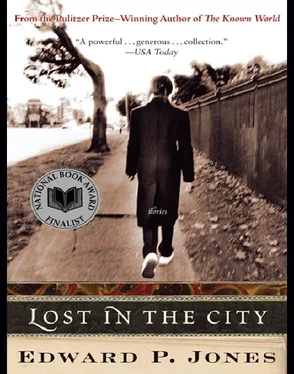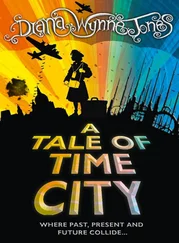“So’s goddamn cookie batter. So what?” Sam said.
“You act as if it’s easy for me to write him. It’s not. Sometimes I’m afraid, but he keeps writing me, and he sends me things, becomes a father. He sends me things for my son. I want to write ‘Why?’ but all I can manage to ask is, ‘How was your day?’ He scares me sometimes, because it’s overwhelming, so it’s not as if I look forward to hearing from him. He wants to see me, but I always tell him no. Give me credit for that.”
He took her arm and squeezed it. “You give us the word,” he said. “Just give us the word and we’ll break his neck in a thousand places. Break his hands so he can’t ever write again.” In a few seconds he had become something else.
“No,” and she pulled away, looking at him in that “Who are you?” way she did before she became comfortable with him again. “Is that what you think I want?”
“Who the hell knows what you want.”
Outside, Maddie, in a chair under the peach tree, had the baby with his head resting on her shoulder and, with two more pats on the back, the baby finally rewarded her with a loud burp that even Sam and Madeleine could hear. The adults in the backyard shouted “Hooray!” which frightened the child and he began to cry.
“You should talk to him or something,” Madeleine said. “He’s your son’s grandfather.”
Sam pulled the pitcher forward and wrapped her fingers around the handle. “You listen to me good: I been all over the damn world,” he said, “so when I came back here I knew what I wanted to put in my own world, and he’ll never be in it. He’s the only black person who can never be in it. We have our wife and child, and you and Maddie and Hazel’s family. And there’re new friends all over Anacostia I’ve made, and people who come in the bakery, and people at that church Hazel drags me to.” He parted Hazel’s lace curtains to get a better look at those in the backyard. “Now and again we meet a complete stranger we like a whole lot and I include that person in.” He released the curtains, then straightened them. “But no matter how big we make that world, it’ll never be big enough to include him. And he’s very lucky, cause we could have killed him a long time ago. I’ve driven over there a hundred times to do it — that’s how much I hate him. But I won’t. We won’t unless you and Maddie told us that’s what yall want. Every day he wakes up he should feel lucky.”
He took the pitcher from her. “Your trouble’s that you live up there among all them white people. With the ghost people. They believe in that all forgivin shit, in all that stuff that cripples the soul. You should move out to Anacostia to be with real people, the people who know what day and night is like and never get the two confused.” Then he put his hands at the corners of her mouth and tried to fashion a smile. She hugged him, clung to him, and for those moments they were no more or less than a boy and girl without a mother and father.
Madeleine and Curtis had planned to spend Mother’s Day at the Children’s Center with their child, but Curtis’s father became ill during the week and Curtis went to Norfolk. Madeleine would have waited until he returned to visit the center, but she did not want too much time to pass after Mother’s Day before she saw her son.
On the Sunday morning following Mother’s Day, she was ready to leave her apartment when the chime on her door rang. She opened the door without looking through the peephole. Samuel stood before her, holding a paper bag with one hand and removing his hat with the other. What she saw was not the man in the letters with the beautiful handwriting, not the man of the poems.
“I’m your father,” he said. He smiled and looked momentarily down at his shoes. At five, she stopped counting his missing teeth.
“How did you get in here?” she asked, looking to either side of him into the hall. “The front door is always locked.”
He stopped smiling. “Somebody was comin in and I got to the door fore it closed. I know this ain’t spected. I wanted to wish you a happy Mother’s Day.” He sounded like every black country person she had ever heard, those people who talked of fetchin this and wearin britches and someone commencin to do such and such.
“Mother’s Day was last Sunday. It’s past,” she said.
“I know,” he said. “I started up here last Sunday, but I left your address at home and when I tried to go by memory, I got lost. Never get lost in white folks’ neighborhood. The first law a the land.” He smiled again. His suit coat and pants had been stylish a generation ago. They did not match, though they were both a dark blue that might appear similar at a glance. His dark gray fedora was now so old that it had the look of something abandoned, something a child pretending to be an adult might wear at Halloween.
“Well, I’m on my way out. I’m afraid I’ve no time for a visit.”
“I can take you,” he said. “I can take you wherever you wanna go. I got a car and I can take you wherever you need to go.”
“I have my own car. Thanks,” she said.
“But I can save you wear and tear on yours,” he said. “Save you gas, too. Sides”—and he reached into the paper bag and pulled out a red, drug-store box of chocolates—“I brought you this. Happy Mother’s Day. You can eat em on the way to where you goin.”
She told him thanks and placed the box on the table by the door. She did not tell him that she had once, before age twelve, been able to eat all the chocolate she wanted, but now all chocolate made her ill.
With her directions, Samuel drove out of Washington and found the Baltimore-Washington Parkway, heading to Laurel and the center. He and his car smelled heavily of cigarette smoke. All that May the days had been wonderful gifts, and that day was no exception. After they had crossed into Maryland, after there was enough fresh air blowing through the car to force out the smoky air, she relaxed somewhat and lay back in her seat.
“I been tryin to get up the nerve to come see you for a long time,” he said at one point, “but I guess it took spring to give me the nerve I needed.” He drove with his hat cocked back on his head. It was a sight she remembered from somewhere, but she did not know if it was a memory of him from before they had stopped being a family or from some movie she had seen with Curtis. “It ain’t like goin to the store and buyin a loaf of bread, I know that.”
Before long, she directed him onto the center’s grounds and he parked in front of the infirmary. The infirmary was a one-story brick building of offices and wards where the city people kept the most severely retarded residents, those children and adults who could not talk or walk or feed themselves or communicate. There, too, were the patients from other buildings who had been beaten by the staff or other residents or who had been injured accidentally or neglected to the point where they could no longer care for themselves.
On the lawn there was a family fussing over a fellow who could have been five or in his teens or a man of thirty or so, and who was sitting in the lap of a woman who may have been his mother. Two cars down from where Samuel parked, a man was working deep under the hood of an ancient car. The woman raised her arm and gave an uncomfortably loud hello to Madeleine and Samuel.
Inside the building, they saw no one until they had walked far down the hall to D Ward. All the way down they could hear the crying and cackling and laughing and shouting of those in other wards. Madeleine realized that she had come without some treat — pieces of fruit or a small box of cookies, something that Curtis usually remembered to bring. At D Ward, after the attendant had wheeled the child Sam out of his ward and left without having spoken one word, Samuel bent down and kissed the boy on the cheek, which embarrassed Madeleine. Sam blinked once and then after a few seconds he blinked again. In the ward, those patients not in their beds were in wheelchairs, gathered around a very loud television set propped up on a dull blue bureau that had no drawers. The only person in the room who seemed interested in the television was an attendant painting her fingernails.
Читать дальше












